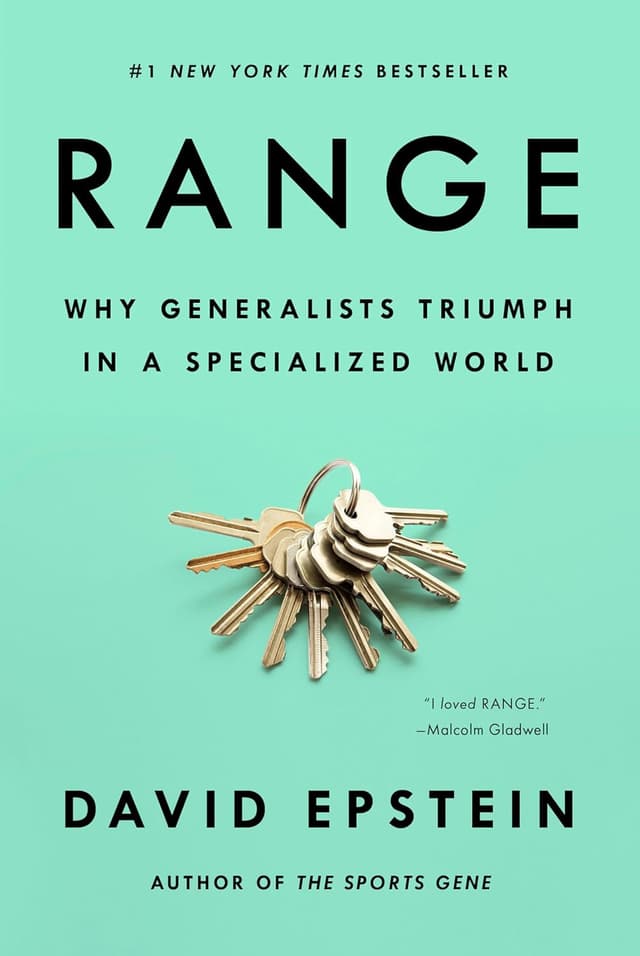Jason Angel | April 8, 2024
The Monday Media Diet with Jason Angel
On Range, Language Transfer, and Paradise Lost
Recommended Products

A book resonating with the theme of adaptability and the ability to be effective in any role, a trait highlighted in Special Forces.
Jason Angel (JA) is a friend of WITI/US Army Special Forces veteran. We’re happy to have him with us today. -Colin (CJN)
Tell us about yourself.
I’m Jason, a long-time Army Special Forces operator who did a brief stint in the tech industry and am now working for the University of Massachusetts Lowell. I help coordinate various government funded research initiatives and University collaboration with industry. It would be fair to say I’m still figuring out what I want to be when I grow up, but I’m enjoying my current work. I’m an insatiably curious guy, so I relish the chance to constantly be exposed to new things.
Describe your media diet.
I have a pretty eclectic media diet these days. I tend to skim various news sites just to catch an idea of major events going on in the world. I tend to cycle through a couple of history podcasts, the President’s Daily Brief, and Big Biology – those are my current ones anyway.
I will occasionally browse Reddit, but I do try to avoid most social media and political content. That wasn’t always the case, but I found they generally don’t add anything to my day besides wasting time and creating anxiety.
What’s the last great book you read?
Range – by David Epstein. It’s not Hemingway, but it resonated with me. There is a saying in one of the special operations organizations that ‘We Are What the Country Needs Us to Be”. Adaptability and the ability to be effective in any role and situation you are placed is a trait that is selected for and nurtured in Special Forces, and I think its an amazing talent that isn’t always appreciated in a word that encourages specialization.
What are you reading now?
The Hellenistic World from Alexander to the Roman Conquest: A Selection of Ancient Sources in Translation. It’s basically an anthology of selected snippets of ancient historians, letters, and stone inscriptions arranged chronologically and thematically.
What’s your reading strategy when you pick up a print copy of your favorite publication?
Truth be told, I rarely pick up physical copies of periodicals. Books – absolutely. Newspaper and magazines, almost never – but after reading an article I usually look at the suggested links below the article and scan for things of interest. If there is a “daily table of contents” I will look at that as well. Because I read most publications online, I have a tendency to start chain-reading myself down the rabbit hole. I’ll start with Fed interest rate hikes and end up on bee population collapse…
Who should everyone be reading that they’re not?
People you disagree with. Due to the polarized nature of society these days most people inhabit insular news and information ecosystems. All of us are spoon fed a filtered and curated version of the world that drives us apart. If you make an effort to view controversial issues from an opposing viewpoint you’ll start to see facts you weren’t exposed to, start identifying propaganda and bad-intent framing on both sides of the issue. You certainly shouldn’t compromise your principles, but you might see not every issue has a right or wrong answer, the world is complicated, and the media is designed to keep you engaged by getting you angry and anxious and not necessarily by giving you best information.
What is the best non-famous app you love on your phone?
Language Transfer and ToposText. Language transfer is cool, it’s essentially a bunch of audio recordings of an instructor starting from zero in a language and building your understanding of it organically. I’ve had a lot of exposure to foreign language education over the years, and I think most of it is poorly done. Language transfer is a different approach.
ToposText is very niche – it’s a collection of ancient texts that have the place names and social groups tagged so that you can tap on it and see where it is on a world map. If you’ve ever read an ancient author and wondered where they were talking about – this is your app.
Plane or train?
Train. Europe does rail travel right, and its really nice to be able to book a reasonably cheap seat and just… hang out while the world goes by and you travel from one place to the next. No shoe removal or backscatter x-ray required. The US doesn’t quite have the same passenger rail system going on, which is unfortunate.
What is one place everyone should visit?
Some place foreign, exotic, and as different from where you live as you can afford. Most people realize that other cultures are different, but it is deeply educational to go and see what that looks like in action. You get a sense that there a lots of ways to organize societies, and that your ideas aren’t necessarily the “right” ones. If you actually speak at length with people there, you’ll also see that, despite our differences, everyone everywhere has far more in common than people would have you believe.
If you can’t afford to do that, come to Boston! You still won’t be able to afford it, but the apple cider donuts are great.
Tell us the story of a rabbit hole you fell deep into.
So, about two years ago I went to read Paradise Lost, and didn’t understand it. It’s a difficult read, but that’s not what I mean – I didn’t understand all of the references, and Milton obviously didn’t think you’d need an annotated version with footnotes to explain everything. I was told that you really need to read Dante’s Inferno first. So I started doing just that and ran into the same problem. Why is a roman poet named Virgil guiding him, who are all these people he’s referring to in hell? Again, you should read the Aeneid first…
I gave up and started reading Machiavelli, and hit the same wall. He expected me to understand who Sulla was. After looking into it I found out that everyone’s education all the way up to the 19th century was essentially a marathon reading of all the ancient Greek and Roman authors. All of the “classic” authors just assumed you had the same baseline knowledge of the Greco-Roman world, and they constantly made use of it. So, I decided I would go read all the same books. How many could there be, right?
Turns out there is a lot... I’ve been on a marathon reading kick for two years now, with some breaks, and I have enough books I’ve already bought waiting to be read to keep me going for probably another year or two if I can stop branching off onto tangents. (The Persians were Zoroastrians? Oooo better read The Avesta) Human nature is rather unchanging, and it’s instructive to see our modern problems on full display in the ancient world and read about their attempts to grapple with the same issues we do. I find it all fascinating. However, my wife is less amused at my literary hoarding tendencies and I’ve started dabbling in Greek. So, yes, I went all the way down the rabbit hole and haven’t hit bottom yet. (JA)
—
Thanks for reading,
Noah (NRB) & Colin (CJN) & Jason (JA)
—
Why is this interesting? is a daily email from Noah Brier & Colin Nagy (and friends!) about interesting things. If you’ve enjoyed this edition, please consider forwarding it to a friend. If you’re reading it for the first time, consider subscribing.
